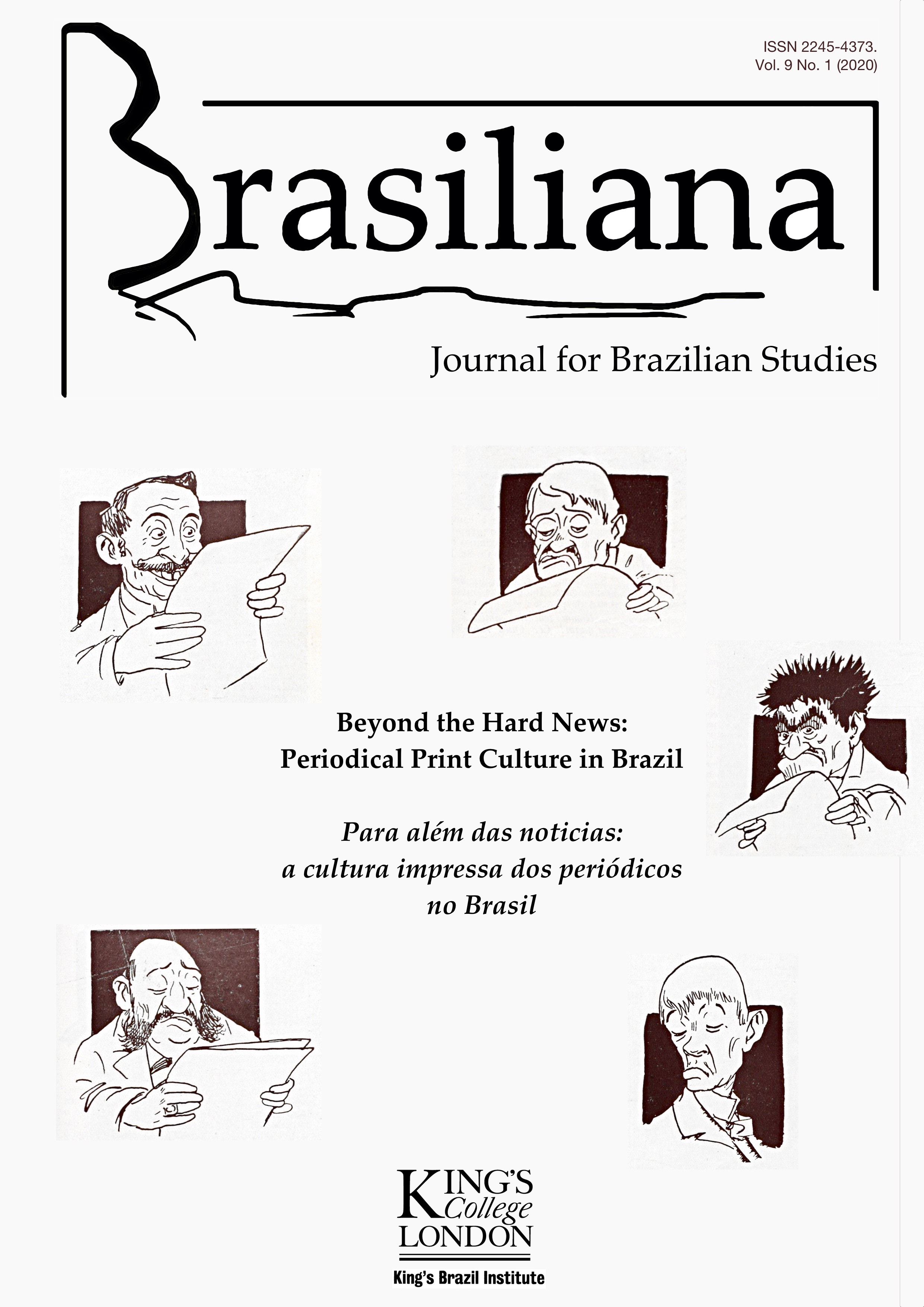The Challenges of the First Black Political Party in Brazil: Seeking Alliances in Unsympathetic Territory
Main Article Content
Abstract
This paper examines the rapprochement between the first black political party in Brazil – Brazilian Black Front - and the fascist party - Brazilian Integralist Action - as a microcosm to assess the challenges faced by Afro-Brazilians in the initial stages of black political activism in the changing Brazilian political atmosphere in the 1930s. The mutual opposition to European immigration, the authoritarian inclinations in the leadership of both parties, and the failure of the other side of the political spectrum, led by the Communist Party, to address race, are the three suggested explanations to explain such political collaboration. This study demonstrates that the first Brazilian black political party faced a twofold challenge. At same time that it attempted to find its own political voice, it needed to assess the best alternatives to seek political coalitions in a setting still dominated by whites who were reluctant to acknowledge racial inequalities in Brazilian society.
Article Details
![]()
Articles published in Brasiliana are licensed under a Creative Commons Attribution-NonCommercial-NoDerivs 3.0 Unported License.
When publishing open access, the author signs an author publishing agreement in which they retain copyright and give Brasiliana the right to publish the article. Our Open Access publications are distributed under the terms of the Creative Commons Attribution 4.0 International License, which permits unrestricted use, distribution, and reproduction in any medium, provided the original work is properly cited.
References
Andrews, George Reid. Blacks & Whites in São Paulo, Brazil, 1888-1988. Madison, Wis.: University of Wisconsin Press, 1991.
Bailey, Stanley R. Legacies of Race: Identities, Attitudes, and Politics in Brazil. Stanford, Calif.: Stanford University Press, 2009.
Bertonha, João Fabio “Entre Mussolini and Plínio Salgado: O Fascismo Italiano, O Integralismo, e o Problema dos descendentes de Italianos no Brasil”, Revista Brasileira de História 21, no.40 (São Paulo 2001): 85-105
Chadarevian, Pedro C. “Raça, Classe, e Revolução no Partido Comunista Brasileiro (1922-1964), Política e Sociedade 11, no.20 (April 2012): 255.
Costa, Emília Viotti Da. The Brazilian Empire: Myths and Histories. Chicago: University of Chicago, 1985.
Diário Oficial de São Paulo, São Paulo, Nov.4, 1931. https://www.jusbrasil.com.br/diarios/DOSP/1931/11/04
Domingues, Petronio “O Messias Negro? Arlindo Veiga dos Santos (1902-1978) Viva a Nova Monarquia, Viva Dom Pedro III”, Varia Historia 36 no.22 (July/Dec 2006): 517-536.
_________ Petronio “Um Templo de Luz: Frente Negra Brasileira (1931-1937) e a Questão da Educação”, Revista Brasileira de Educação 13, no.39 (set/dec. 2008): 522.
_________Petronio. "Movimento Negro Brasileiro: Alguns Apontamentos Historicos." Tempo - Revista Do Departamento De Historia Da UFF, 2007, 100- 122.
Edgar Carone, A República Velha: Evolução Política, (Difusão Européia do Livro 1975).
Fausto, Boris. A Revolução De 1930: Historiografia E História. 2.nd ed. São Paulo: Editôra Brasiliense, 1972.
Fernandes, Florestan. A Integração Do Negro Na Sociedade De Classes. Ciências Sociais Dominus, 3. São Paulo: Dominus Editora, 1965.
Ferreira, Lilian Tavares de Barros “A Imprensa Feminina da Ação Integralista Brasileira: Algumas Funções Poliiticas e Sociais das Blusas Verdes Representadas na Revista Brasil Feminino”, XXIX Congresso Nacional de História, 2007.
Folha de São Paulo, “Portugueses Nem Pisaram na África, Diz Bolsonaro Sobre Escravidão”, Accessed April 1, 2019.
Freyre, Gilberto. The Masters and the Slaves (Casa-grande & Senzala); a Study in the Development of Brazilian Civilization. Abridged from the 2d English-language Ed., Rev. ed. Borzoi Books on Latin America. New York: Knopf, 1964.
Gillette, Aaron “The Origins of the Manifesto of Racial Scientists” Journal of Modern Italian Studies. vol. 6 (2001).305:323
Gonçalves, Leandro Pereira, “The Integralism of Plinio Salgado: Luso-Brazilian Relations” Portuguese Studies 30, no.1 (2014): 67-93.
Hilton, Stanley E.” Ação Integralista Brasileira: Fascism in Brazil: 1932-1938”, Luso-Brazilian Review 9, no.2 (Winter 1972): 12:36..
Johnson, Ollie A. "Racial Representation and Brazilian Politics: Black Members of the National Congress, 1983–1999." Journal of Interamerican Studies and World Affairs 40, no. 4 (1998): 97-118.
Love, Joseph L. "Political Participation in Brazil, 1881-1969." Luso-Brazilian Review 7, no. 2 (1970): 3-24.
Mattoso, Kátia M. De Queirós. To Be a Slave in Brazil, 1550-1888. New Brunswick, N.J.: Rutgers University Press, 1986
Mitchell, Gladys. "The Politics of Skin Color in Brazil." The Review of Black Political Economy 37, no. 1 (2010): 25-41.
Oliveira, Kimberly F. Jones-de. "The Politics of Culture or the Culture of Politics: Afro-Brazilian Mobilization, 1920-1968." Journal of Third World Studies 20, no. 1 (2003): 103-120.
Schwartz, Stuart B. Slaves, Peasants, and Rebels: Reconsidering Brazilian Slavery. Blacks in the New World. Urbana: University of Illinois Press, 1992.
Skidmore, Thomas E. Politics in Brazil, 1930-1964; an Experiment in Democracy. New York: Oxford University Press, 1967.
________ Thomas E. Black into White; Race and Nationality in Brazilian Thought. New York: Oxford University Press, 1974.
Silva, Rogério Souza “A Política Como Espetáculo: A Reinvenção da HIstória Brasileira e a Consolidação dos Discursos e das Imagens Integralistas na revista Anauê!” Revista Brasileira de História 25 no. 50(July/Dec 2005): 61-95.
Sotero, Edilza, “Representação Política Negra no Brasil Pós Estado Novo”, PhD Dissertation, Universidade de São Paulo, 2015.

